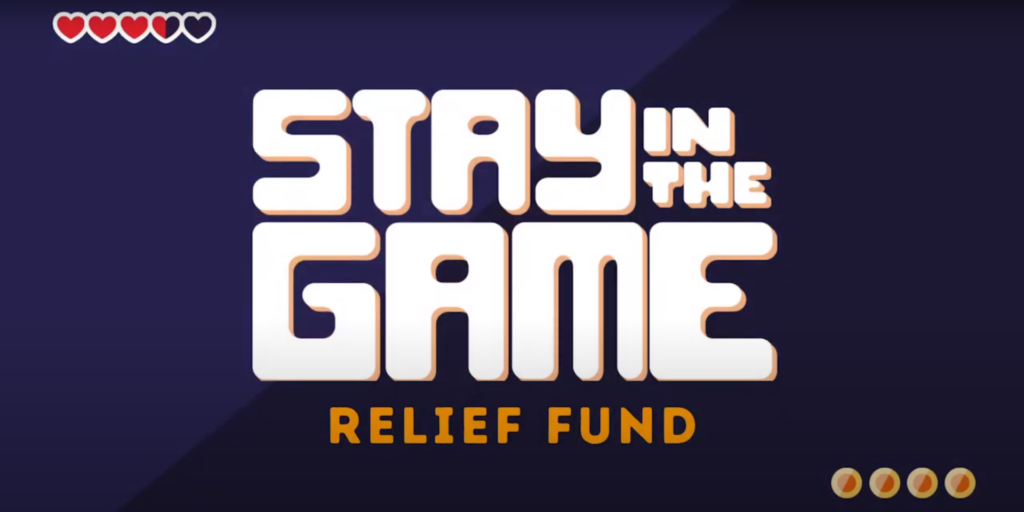
If game development was a difficult environment before the coronavirus pandemic, it’s doubly so now. Today, global quarantine orders have caused many major studios to adjust projections and workflow as they transition to work-from-home policies. As a result, the already-mentally-taxing nature of the field has been highlighted as workers are forced to grapple with the state of the world in addition to the standard challenges of game development.
Further, some of the more unsavory aspects of the industry have been propelled to the forefront thanks to the pandemic. Deeply-ingrained flaws like crunch and a stark lack of diversity are emphasized in today’s strenuous landscape, which can exact a heavy toll on the mental health of games industry workers.
To that end, the IGDA Foundation, in conjunction with others, has launched the Stay in the Game Relief Fund, a fundraiser benefiting a handful mental health-focused nonprofit organizations, including the IGDA Foundation itself.
“The cancellation of conferences and other in-person networking opportunities means we need to quickly pivot to create programs in virtual spaces,” Nika Nour, executive director of the IGDA Foundation, told GameDaily. “The diversity gap in the video game workforce is already problematic, so we can’t wait until 2021 to introduce a new generation of leaders. Our organizations’ work is more important now than ever to ensure marginalized groups have access to opportunities.”

Other than the IGDA Foundation, the funds raised by Stay in the Game will go to Take This, Global Game Jam, and the Games and Online Harassment Hotline, each of which is dedicated to fostering a more diverse and safe games industry. While Nour admits that diversity and inclusion may not be a priority for many major game companies at the moment, that doesn’t make it any less important. In fact, it is perhaps more important than ever to foster diversity in the games industry.
“I encourage studios to lean on and partner with the IGDA Foundation to support diverse talent acquisition and retention during this global pandemic. We’re here to find solutions to these very real problems and will fight to narrow the gap,” Nour said.
The Stay in the Game Fund boasts a handful of corporate sponsors–including Double Fine and Riot Games–that have pledged to match 100% of the donations received. Among them is Devolver Digital, the indie publishing label behind Gris, Enter the Gungeon, and Hotline Miami.
“These are all fantastic organizations doing much-needed work to make our weird little subculture a safer, more inclusive place, and they have been at this long enough to know how to make it easy for little companies like ours to help,” Mike Wilson, co-founder of Devolver Digital, told GameDaily. “This is the time for us all to come together as a community more than ever, and see where we can be helpers. The alliance of these four organizations has made it as easy as possible to contribute, and with all of the sponsors matching, they can really maximize the impact of anything anyone is able to give at this time. You won’t find more committed nonprofits to support.”
Wilson said that Stay in the Game strikes home thanks to his own personal experiences with anxiety and depression. For those that may be feeling the effects for the first time thanks to pandemic-bred isolation, though, the fund–and the organizations it benefits–can be invaluable learning tools. Take This, for instance, is a veritable treasure trove of assets for those among us who may be new to the mental health struggle.
“There are lots of great, free, resources available from the Take This website,” Wilson said. “Sometimes all we need is someone to talk to, and luckily we live in a time now where we can find an ear anywhere on the planet at any time, and more and more people are volunteering now to be that ear via various apps and services.”
Looking at the Mental Health Resources page on Take This reveals a global suite of crisis hotlines, therapist directories, self-care tools, streaming resources, and more. Eve Crevoshay, executive director of Take This, hopes that this assembly of tools can prove useful. Crevoshay also recommends some useful practices that you can engage in at home that may help in reducing stress.
“The first thing to do is acknowledge that this is a strange, uncomfortable time with a lot of uncertainty,” Crevoshay told GameDaily. “As we noted in our article on fear, it’s very important to check the facts and identify the elements of our lives that remain within our control. These may include filtering our consumption of news and social media, engaging in daily self-care practices like exercise and meditation that increase our resilience, or reaching out to friends and family via phone, text, or video chat.”
Crevoshay acknowledged that it can be hard to engage in self-care, that it can sometimes feel like a burden in today’s oppressive environment. But all habits feel unnatural at first, and sticking it out can yield staggering results. Self-care, she said, forms the foundation upon which strong mental health is built. Once that foundation is in place, you can begin to reach out to others, whether it’s a friend, family member, or a therapist.
“Make as many connections as you can–you can even schedule regular calls or video chats. And don’t be shy about being the first to reach out; we’re all in the same boat right now!”

When stay-at-home orders began to take effect, many turned to video games as a primary form of entertainment. Last month, NPD reported that the games market saw a 35% increase in spending in the wake of quarantine orders, noting that this is the highest bump the medium has seen in over half a year. For this reason, Nour said that the teams behind our favorite games ought to be recognized and appreciated, and that the industry shouldn’t stop fostering new and diverse talent.
“As consumers learn to play apart together, we must remember the people who make games happen and make sure the game development workforce is as diverse as its players,” Nour said. “Just because in-person events aren’t happening doesn’t mean we should forego remote internships and working opportunities for the graduating class of 2020 or people from underrepresented communities seeking to transition into their first gig in the industry.”
Nour said that the IGDA Foundation can help in this regard. Before the pandemic, the organization would select a handful of current or recent college students and provide them the opportunity to attend an industry conference such as GDC. There, the recipient would receive IGDA mentorship and Q&A opportunities with industry professionals.
Now, though, with in-person events a thing of the past–and the distant future, perhaps–the IGDA Foundation has had to reexamine and adapt its methods. Hence, the Stay in the Game Fund.
“The IGDA Foundation is incredibly passionate about ensuring the success of our scholarship grantees, and everyone from underrepresented communities,” Nour said. “We are going to push through these obstacles and make it easier for developers entering the workforce to build skills, meet mentors, and find jobs. Entering the video game industry already carries unique challenges, and we will not allow this pandemic and the isolation it has caused to be another obstacle.”
For many large publishers and developers, transitioning to a work-from-home has been a tough adjustment. Alterations to workflow means slower communications within the larger teams that have been displaced by COVID-19, resulting in game delays. For Wilson, though, things have continued apace thanks to Devolver’s comparatively small team.
“Devolver has been doing fine, mostly. We have always been a virtual company spread out all over the globe, so not much has changed workflow wise, other than not getting to see each other at shows and conventions, and not getting to visit with developers face-to-face,” Wilson said. “And we changed our weekly call to a video call just because we miss one another, and it’s nice to see people check in healthy. We have a bit of ‘survivor’s guilt,’ I think, for being in a business that hasn’t really been impacted too severely, so we’re just checking in with our partners and community and helping where we can.”

Wilson said that if there’s one positive that comes out of quarantine, it’s that companies come to understand the value of remote work. While working from home presents its own set of challenges, being in close proximity to family can be a boon to morale, which can lead to a more productive workday. Wilson said that he hopes the industry recognizes this, and makes permanent changes in this regard.
While Nour agrees that there is importance in recognizing that remote work can be productive, she also said that there’s just no supplanting in-person work.
“We’re learning which meetings could be emails and which jobs don’t really require two to three hours of daily commuting,” Nour explained. “That said, you can never really replace the power of person-to-person interaction, networking opportunities, and more.”
In the end, though, what’s most important right now is to make sure we take care of our mental health. Productivity stems from morale, which we can’t always control, but there are resources that can help us cope. This is what makes the Stay in the Game Fund so critical.
“COVID-19 has taken so much from so many in our community. We can’t allow it to take anything else, including the support systems and avenues of inclusion these four organizations have built,” Nour said. “When people donate to the Stay in the Game initiative, they are supporting the mental and emotional health of our global gaming community at a time when everyone is vulnerable.”
The fund also seeks to mitigate the pandemic’s effect on the industry’s most marginalized groups–transgender people, women, people of color–by helping them find security in today’s challenging landscape. Together, the four nonprofits and six corporate sponsors involved in Stay in the Game are hoping to eliminate at least a little bit of the uncertainty.
“We’re so appreciative of this outpouring of support from our friends. Those who look beyond their own bottom line and step up to endorse diversity and inclusion efforts when there are only
so many hours in the day are absolute champions,” Nour said. “It’s truly inspiring to see video game companies step up and support four nonprofits who work tirelessly in service of the community. It’s easy to be skeptical and pessimistic right now, but bringing the community together in this way during tough times is a demonstration of true leadership and authority in this space.”
It’s that sense of unity that drives Nour, Crevoshay, Wilson, and everyone else involved in Stay in the Game. We’re all in this together, after all, and it’s important to recognize that things are difficult. It’s equally important, though, to recognize that there are resources out there that can help us weather the storm.
Sam, the Editor-in-Chief of GameDaily.biz, is a former freelance game reporter. He's been seen at IGN, PCGamesN, PCGamer, Unwinnable, and many more. When not writing about games, he is most likely taking care of his two dogs or pretending to know a lot about artisan coffee. Get in touch with Sam by emailing him at sdesatoff@rektglobal.com or follow him on Twitter.
 GameDaily.biz © 2026 | All Rights Reserved.
GameDaily.biz © 2026 | All Rights Reserved.